中英语语法反意疑问句归纳总结
中考英语语法考点知识复习_反义疑问句
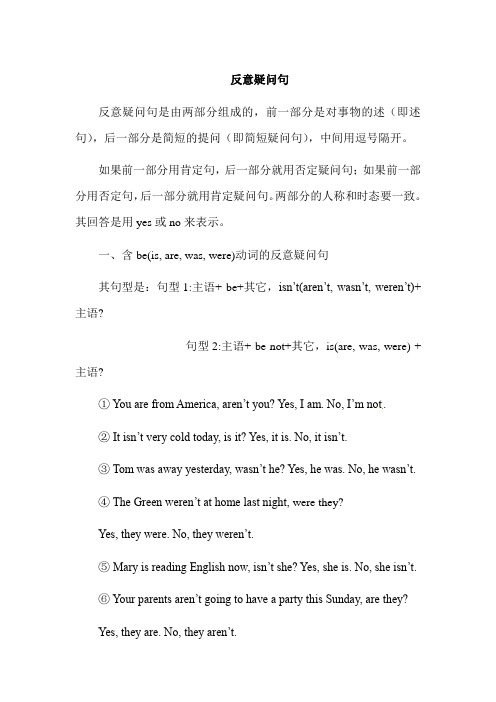
反意疑问句反意疑问句是由两部分组成的,前一部分是对事物的述(即述句),后一部分是简短的提问(即简短疑问句),中间用逗号隔开。
如果前一部分用肯定句,后一部分就用否定疑问句;如果前一部分用否定句,后一部分就用肯定疑问句。
两部分的人称和时态要一致。
其回答是用yes或no来表示。
一、含be(is, are, was, were)动词的反意疑问句其句型是:句型1:主语+ be+其它,isn’t(aren’t, wasn’t, weren’t)+ 主语?句型2:主语+ be not+其它,is(are, was, were) + 主语?① You are from America, aren’t you? Yes, I am. No, I’m not.② It isn’t very cold today, is it? Yes, it is. No, it isn’t.③ Tom was away yesterday, wasn’t he? Yes, he was. No, he wasn’t.④ The Green weren’t at home last night, were they?Yes, they were. No, they weren’t.⑤ Mary is reading English now, isn’t she? Yes, she is. No, she isn’t.⑥ Your parents aren’t going to have a party this Sunday, are they?Yes, they are. No, they aren’t.⑦ The girls were singing when the teacher came in, weren’t they?Yes, they were. No, they weren’t.注意:There be句型① There is an old picture on the wall, isn’t there?Yes, there is. No, there isn’t.② There aren’t any children in the room, are there?Yes, there are. No, there aren’t.③ There wasn’t a telephone call for me, was there?Yes, there was. No, there wasn’t.④ There were enough people to pick apples, weren’t there?Yes, there were. No there weren’t.二、行为动词的一般现在时的反意疑问句其句型是:句型1: 主语+动词原形+其它,don’t I(you, we, they)?句型2: 主语+ don’t+动词原形+其它,do I(you, we, they)?句型3: 主语+动词第三人称单数+其它,doesn’t he(she, it)?句型4: 主语+ doesn’t+动词原形+其它,doeshe(she, it)?① You often watch TV in the evening, don’t you? Yes, I do. No, I don’t.② The students don’t study hard, do they? Yes, they do. No, they don’t.③ Mary studies Chinese hard, doesn’t she? Yes, she does. No, she doesn’t.④ The boy doesn’t often go to school by bike, does he?Yes, he does. No, he doe sn’t.⑤The first class begins at eight, doesn’t it? Yes, it does. No, it doesn’t.三、行为动词的一般过去时的反意疑问句其句型是:句型1: 主语+动词过去式+其它,didn’t+主语?句型2: 主语+didn’t+动词原形+其它,did +主语?① You watched TV last night, didn’t you? Yes, I did. No, I didn’t.② Ji m’s parents didn’t go to Hong Kong last month, did they?Yes, they did. No, they didn’t.③ The rain stopped, didn’t it? Yes, it did. No, it didn’t.④Mr. Clarke didn’t buy a car, didn’t he? Yes, he did. No, he didn’t.四、一般将来时的反意疑问句其句型是:句型1: 主语+will+动词原形+其它,won’t+主语?句型2: 主语+ won’t +动词原形+其它,will +主语?①The boys will play games, won’t they? Yes, they will. No, they won’t.② It won’t stop raining, will it? Yes, it will. No, it won’t.③ Mr. Smith will visit our school next week, won’t he? Yes, he will. No, he won’t.注意:There be句型的一般将来时① There will be a basketball match tomorrow, won’t there?Yes, there will. No, there won’t.② There won’t be too much pollution in the future, will there?Yes, there will. No, there won’t.五、现在完成时的反意疑问句其句型是:句型1: 主语+have+动词过去分词+其它,haven’t+主语?句型2: 主语+ haven’t +动词过去分词+其它,have +主语?句型3: 主语+has+动词过去分词+其它,hasn’t+主语?句型4: 主语+ hasn’t +动词过去分词+其它,has +主语?① You have been to Shanghai before, h aven’t you? Yes I have. No, I haven’t.② You haven’t been to Shanghai before, have you? Yes I have. No, I haven’t.③Jack has done his homework, hasn’t he? Yes, he has. No, he hasn’t.④Jack hasn’t done his homework, has he? Yes, he has. No, he hasn’t.六、现在完成进行时的反意疑问句其句型是:句型1: 主语+have been+动词现在分词+其它,haven’t+主语?句型2: 主语+ haven’t been +动词现在分词+其它,have +主语?句型3: 主语+has been +动词现在分词+其它,hasn’t+主语?句型4: 主语+ hasn’t been +动词现在分词+其它,has +主语?① You have been skating for five hours, h aven’t you? Yes, I have. No, I haven’t.② You haven’t been skating for five hours, have you? Yes, I have. No, I haven’t.③ Bob has been collecting kites since 1999, hasn’t he? Yes, he has. No, he hasn’t.④ Bob hasn’t been collecting kites since 1999, has h e? Yes, he has. No, he hasn’t.七、含有情态动词的反意疑问句其句型是:句型1: 主语+情态动词+动词原形+其它,情态动词否定形式+主语?句型2: 主语+情态动词否定形式+动词原形+其它,情态动词+主语?① You can speak French, can’t you? Yes, I can. No, I can’t.②They can’t understand me, can they? Yes, they can. No, they can’t.③ Ann could swim when she was six, couldn’t she? Yes, she could. No, she couldn’t.④ The students must study hard, mustn’t they? Yes, they must. No, they needn’t.注意:You must go home now, needn’t you? Yes, I must. No, I needn’t.★值得注意的是有时英语的谓语动词并不用否定式(即没加上not),而是用上了“never, little, few, hardly, nothing, nobody”等词,这时该述句也属于否定句,因此,反意疑问句的后半部分应用肯定疑问式。
(完整版)初中英语反义疑问句的用法归纳

反义疑问句It looks like rain, doesn’t it?He doesn’t need to work so late, does he?This is a dictionary, isn’t it?Those are shelves, aren’t they?There once was a man named Saint Nicholas, wasn’t there?I am very interested in learning English, aren’t I?4)陈述句的主语是动词不定式,动词的-ing形式或从句时,疑问部分的主语多用it来体现。
如:Taking care of our environment is very important, isn’t it?What he said is right, isn’t it?5)陈述句中含有not, no, hardly, neither, never, few, little, too …to等否定词或具有否定意义的词时,疑问部分常用肯定形式。
如:Few people knew the news, did they?Tom has never been to England , has he?She is unhappy, isn’t she?No one knows him, do they?Someone is waiting for you, isn’t he?Nobody says a word about the accident, do they?Everything seems all right, doesn’t it?7)陈述句是主从复合句时,如果主句的谓语动词是think, believe, expect, feel, guess等词,且主语是第一人称I或we时,反意疑问部分的人称、时态与宾语从句保持一致,同时还要考虑到否定的转移(否定前移)。
九年义务初中英语反义疑问句知识点总结归纳
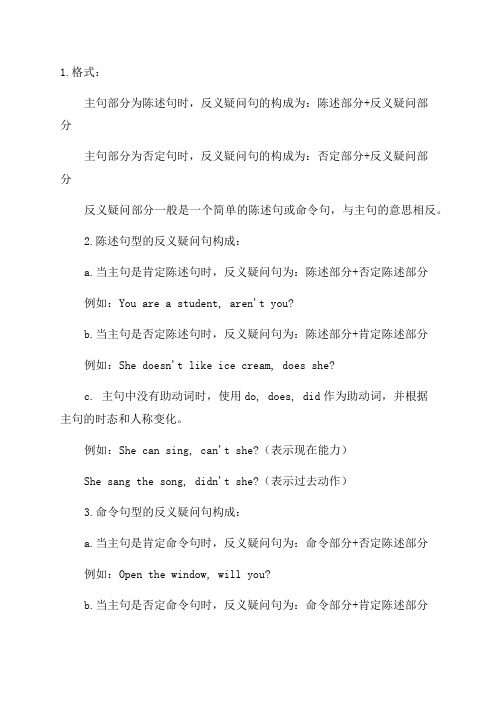
1.格式:
主句部分为陈述句时,反义疑问句的构成为:陈述部分+反义疑问部
分
主句部分为否定句时,反义疑问句的构成为:否定部分+反义疑问部
分
反义疑问部分一般是一个简单的陈述句或命令句,与主句的意思相反。
2.陈述句型的反义疑问句构成:
a.当主句是肯定陈述句时,反义疑问句为:陈述部分+否定陈述部分
例如:You are a student, aren't you?
b.当主句是否定陈述句时,反义疑问句为:陈述部分+肯定陈述部分
例如:She doesn't like ice cream, does she?
c. 主句中没有助动词时,使用do, does, did作为助动词,并根据
主句的时态和人称变化。
例如:She can sing, can't she?(表示现在能力)
She sang the song, didn't she?(表示过去动作)
3.命令句型的反义疑问句构成:
a.当主句是肯定命令句时,反义疑问句为:命令部分+否定陈述部分
例如:Open the window, will you?
b.当主句是否定命令句时,反义疑问句为:命令部分+肯定陈述部分
例如:Don't be late, will you?
4.意义和作用:
a.反义疑问句常用来征求对方的同意、确认或提出建议。
b.反义疑问句的答案通常是肯定或否定的形式,但与主句相反。
c.反义疑问句的语调通常是上扬的,表示疑问或请求。
总的来说,九年义务初中英语反义疑问句是一种表达疑问和确认的语法形式,掌握了这一知识点有助于提高英语交流的准确性和流利度。
英语语法总结反义疑问句
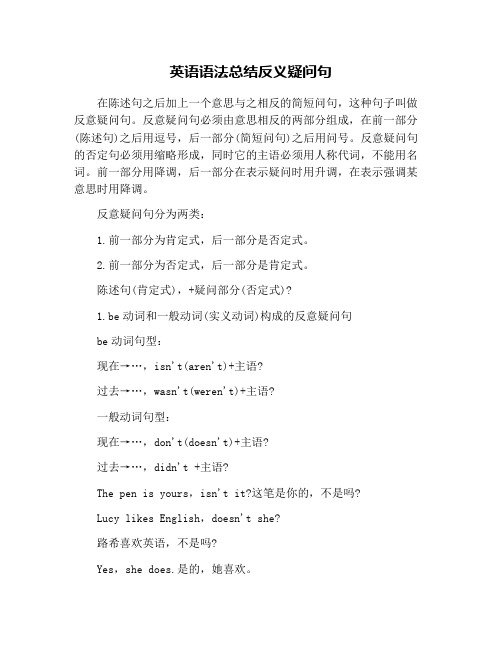
英语语法总结反义疑问句在陈述句之后加上一个意思与之相反的简短问句,这种句子叫做反意疑问句。
反意疑问句必须由意思相反的两部分组成,在前一部分(陈述句)之后用逗号,后一部分(简短问句)之后用问号。
反意疑问句的否定句必须用缩略形成,同时它的主语必须用人称代词,不能用名词。
前一部分用降调,后一部分在表示疑问时用升调,在表示强调某意思时用降调。
反意疑问句分为两类:1.前一部分为肯定式,后一部分是否定式。
2.前一部分为否定式,后一部分是肯定式。
陈述句(肯定式),+疑问部分(否定式)?1.be动词和一般动词(实义动词)构成的反意疑问句be动词句型:现在→…,isn't(aren't)+主语?过去→…,wasn't(weren't)+主语?一般动词句型:现在→…,don't(doesn't)+主语?过去→…,didn't +主语?The pen is yours,isn't it?这笔是你的,不是吗?Lucy likes English,doesn't she?路希喜欢英语,不是吗?Yes,she does.是的,她喜欢。
No,she doesn't.不,她不喜欢。
That was a wonderful night,wasn't it?那是个奇妙的夜晚,不是吗?Yes,it was.是的,它是。
No,it wasn't.不,它不是。
Your sister helped him,didn't she?你姐姐协助了他,不是吗?Yes,she did.是的。
她协助他。
No,she didn't.不。
她没有协助他。
注意反意疑问句中,前后两部分的动词在人称、数和时态上通常保持一致。
另外后一部分的人称代词应和前一部分的主语(名词或代词)保持一致。
Tom is skating,isn't he?(实行时)汤姆在滑冰,不是吗?Yes,he is.是的。
初中英语语法反意疑问句知识点总结

初中英语语法反意疑问句知识点总结初中英语语法反意疑问句知识点总结 反意疑问句 1) 陈述部分的.主语是I,疑问部分要⽤ aren't I. I'm as tall as your sister,aren't I? 2) 陈述部分的谓语是wish,疑问部分要⽤may +主语。
I wish to have a word with you, may I? 3) 陈述部分⽤ no, nothing, nobody, never, few, seldom, hardly, rarely, little等否定含义的词时,疑问部分⽤肯定含义。
The Swede made no answer, did he / she? Some plants never blown (开花), do they ? 4) 含有ought to 的反意疑问句,陈述部分是肯定的,疑问部分⽤shouldn't / oughtn't +主语。
He ought to know what to do, oughtn't he? / shouldn't he? 5) 陈述部分有have to +v. (had to + v.),疑问部分常⽤don't +主语(didn't +主语)。
We have to get there at eight tomorrow, don't we? 6) 陈述部分的谓语是used to 时,疑问部分⽤didn't +主语或 usedn't +主语。
He used to take pictures there, didn't he? / usedn't he? 7) 陈述部分有had better + v. 疑问句部分⽤hadn't you? You'd better read it by yourself, hadn't you? 8) 陈述部分有would rather +v.,疑问部分多⽤ wouldn't +主语。
初中英语语法总结:反义疑问句
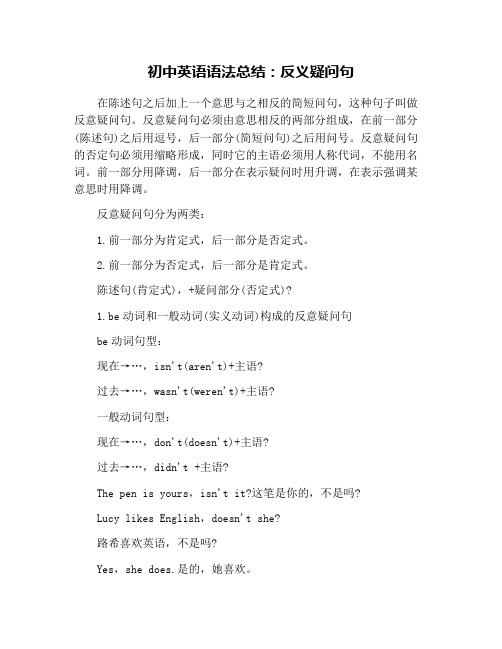
初中英语语法总结:反义疑问句在陈述句之后加上一个意思与之相反的简短问句,这种句子叫做反意疑问句。
反意疑问句必须由意思相反的两部分组成,在前一部分(陈述句)之后用逗号,后一部分(简短问句)之后用问号。
反意疑问句的否定句必须用缩略形成,同时它的主语必须用人称代词,不能用名词。
前一部分用降调,后一部分在表示疑问时用升调,在表示强调某意思时用降调。
反意疑问句分为两类:1.前一部分为肯定式,后一部分是否定式。
2.前一部分为否定式,后一部分是肯定式。
陈述句(肯定式),+疑问部分(否定式)?1.be动词和一般动词(实义动词)构成的反意疑问句be动词句型:现在→…,isn't(aren't)+主语?过去→…,wasn't(weren't)+主语?一般动词句型:现在→…,don't(doesn't)+主语?过去→…,didn't +主语?The pen is yours,isn't it?这笔是你的,不是吗?Lucy likes English,doesn't she?路希喜欢英语,不是吗?Yes,she does.是的,她喜欢。
No,she doesn't.不,她不喜欢。
That was a wonderful night,wasn't it?那是个奇妙的夜晚,不是吗?Yes,it was.是的,它是。
No,it wasn't.不,它不是。
Your sister helped him,didn't she?你姐姐协助了他,不是吗?Yes,she did.是的。
她协助他。
No,she didn't.不。
她没有协助他。
注意反意疑问句中,前后两部分的动词在人称、数和时态上通常保持一致。
另外后一部分的人称代词应和前一部分的主语(名词或代词)保持一致。
Tom is skating,isn't he?(实行时)汤姆在滑冰,不是吗?Yes,he is.是的。
中小学英语语法(反义疑问句)
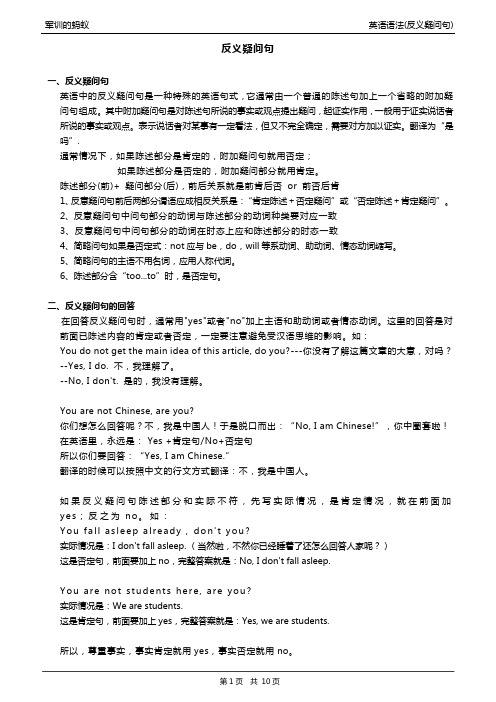
反义疑问句一、反义疑问句英语中的反义疑问句是一种特殊的英语句式,它通常由一个普通的陈述句加上一个省略的附加疑问句组成。
其中附加疑问句是对陈述句所说的事实或观点提出疑问,起证实作用,一般用于证实说话者所说的事实或观点。
表示说话者对某事有一定看法,但又不完全确定,需要对方加以证实。
翻译为“是吗”.通常情况下,如果陈述部分是肯定的,附加疑问句就用否定;如果陈述部分是否定的,附加疑问部分就用肯定。
陈述部分(前)+ 疑问部分(后),前后关系就是前肯后否or 前否后肯1、反意疑问句前后两部分谓语应成相反关系是:“肯定陈述+否定疑问”或“否定陈述+肯定疑问”。
2、反意疑问句中问句部分的动词与陈述部分的动词种类要对应一致3、反意疑问句中问句部分的动词在时态上应和陈述部分的时态一致4、简略问句如果是否定式:not应与be,do,will等系动词、助动词、情态动词缩写。
5、简略问句的主语不用名词,应用人称代词。
6、陈述部分含“too...to”时,是否定句。
二、反义疑问句的回答在回答反义疑问句时,通常用"yes"或者"no"加上主语和助动词或者情态动词。
这里的回答是对前面已陈述内容的肯定或者否定,一定要注意避免受汉语思维的影响。
如:You do not get the main idea of this article, do you?---你没有了解这篇文章的大意,对吗?--Yes, I do. 不,我理解了。
--No, I don't. 是的,我没有理解。
You are not Chinese, are you?你们想怎么回答呢?不,我是中国人!于是脱口而出:“No, I am Chinese!”,你中圈套啦!在英语里,永远是: Yes +肯定句/No+否定句所以你们要回答:“Yes, I am Chinese.”翻译的时候可以按照中文的行文方式翻译:不,我是中国人。
初中英语语法学习知识点归纳之反义疑问句
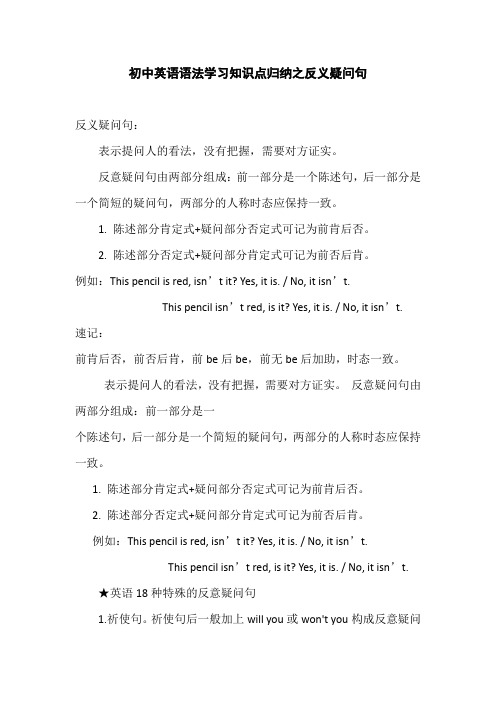
初中英语语法学习知识点归纳之反义疑问句反义疑问句:表示提问人的看法,没有把握,需要对方证实。
反意疑问句由两部分组成:前一部分是一个陈述句,后一部分是一个简短的疑问句,两部分的人称时态应保持一致。
1. 陈述部分肯定式+疑问部分否定式可记为前肯后否。
2. 陈述部分否定式+疑问部分肯定式可记为前否后肯。
例如:This pencil is red, isn’t it? Yes, it is. / No, it isn’t.This pencil isn’t red, is it? Yes, it is. / No, it isn’t.速记:前肯后否,前否后肯,前be后be,前无be后加助,时态一致。
表示提问人的看法,没有把握,需要对方证实。
反意疑问句由两部分组成:前一部分是一个陈述句,后一部分是一个简短的疑问句,两部分的人称时态应保持一致。
1. 陈述部分肯定式+疑问部分否定式可记为前肯后否。
2. 陈述部分否定式+疑问部分肯定式可记为前否后肯。
例如:This pencil is red, isn’t it? Yes, it is. / No, it isn’t.This pencil isn’t red, is it? Yes, it is. / No, it isn’t.★英语18种特殊的反意疑问句1.祈使句。
祈使句后一般加上will you或won't you构成反意疑问句,用will you 多表示“请求”,用won't you 多表示提醒对方注意。
例如:Look at the blackboard, will you/ won't you?看黑板,好吗?Let 引导的祈使句有两种情况:1) Let's...后的反意疑问句用shall we或shan't we。
例如:Let's go home, shall we/ shan't we? 回家吧,好吗?还可以用may I来表示征求对方的同意或许可。
初中英语语法总结反义疑问句
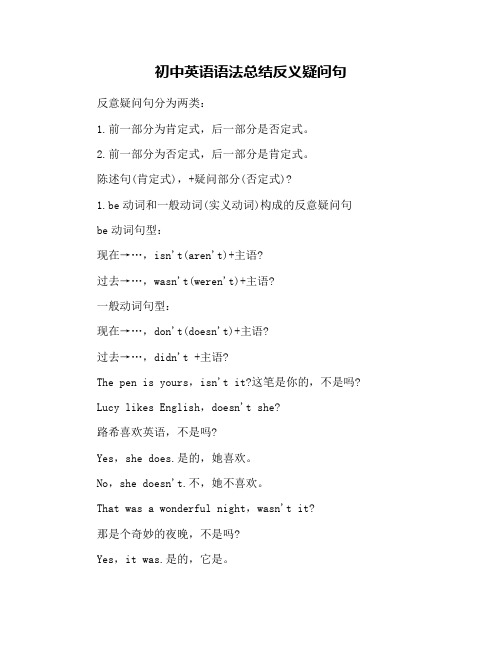
初中英语语法总结反义疑问句反意疑问句分为两类:1.前一部分为肯定式,后一部分是否定式。
2.前一部分为否定式,后一部分是肯定式。
陈述句(肯定式),+疑问部分(否定式)?1.be动词和一般动词(实义动词)构成的反意疑问句be动词句型:现在→…,isn't(aren't)+主语?过去→…,wasn't(weren't)+主语?一般动词句型:现在→…,don't(doesn't)+主语?过去→…,didn't +主语?The pen is yours,isn't it?这笔是你的,不是吗? Lucy likes English,doesn't she?路希喜欢英语,不是吗?Yes,she does.是的,她喜欢。
No,she doesn't.不,她不喜欢。
That was a wonderful night,wasn't it?那是个奇妙的夜晚,不是吗?Yes,it was.是的,它是。
No,it wasn't.不,它不是。
Your sister helped him,didn't she?你姐姐协助了他,不是吗?Yes,she did.是的。
她协助他。
No,she didn't.不。
她没有协助他。
注意反意疑问句中,前后两部分的动词在人称、数和时态上通常保持一致。
另外后一部分的人称代词应和前一部分的主语(名词或代词)保持一致。
Tom is skating,isn't he?(实行时)汤姆在滑冰,不是吗?Yes,he is.是的。
No,he isn't.不。
She is loved by her parents,isn't she?(被动语态)她被她父母亲疼爱着,不是吗?Yes,she is.是的。
No,she isn't.不。
实行时和被动语态的反意疑问句的形式和be动词、一般动词的反意疑问句句型一样。
初中英语反意疑问句的知识点
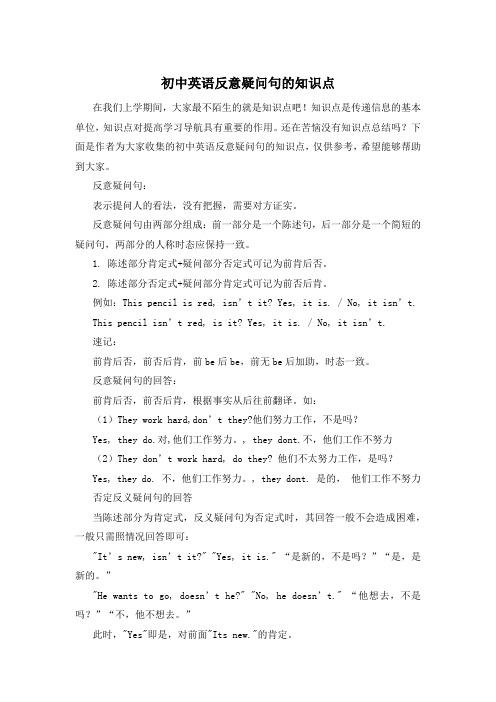
初中英语反意疑问句的知识点在我们上学期间,大家最不陌生的就是知识点吧!知识点是传递信息的基本单位,知识点对提高学习导航具有重要的作用。
还在苦恼没有知识点总结吗?下面是作者为大家收集的初中英语反意疑问句的知识点,仅供参考,希望能够帮助到大家。
反意疑问句:表示提问人的看法,没有把握,需要对方证实。
反意疑问句由两部分组成:前一部分是一个陈述句,后一部分是一个简短的疑问句,两部分的人称时态应保持一致。
1. 陈述部分肯定式+疑问部分否定式可记为前肯后否。
2. 陈述部分否定式+疑问部分肯定式可记为前否后肯。
例如:This pencil is red, isn’t it? Yes, it is. / No, it isn’t.This pencil isn’t red, is it? Yes, it is. / No, it isn’t.速记:前肯后否,前否后肯,前be后be,前无be后加助,时态一致。
反意疑问句的回答:前肯后否,前否后肯,根据事实从后往前翻译。
如:(1)They work hard,don’t they?他们努力工作,不是吗?Yes, they do.对,他们工作努力。
, they dont.不,他们工作不努力(2)They don’t work hard, do they? 他们不太努力工作,是吗?Yes, they do. 不,他们工作努力。
, they dont. 是的,他们工作不努力否定反义疑问句的回答当陈述部分为肯定式,反义疑问句为否定式时,其回答一般不会造成困难,一般只需照情况回答即可:"It’s new, isn’t it?" "Yes, it is." “是新的,不是吗?”“是,是新的。
”"He wants to go, doesn’t he?" "No, he doesn’t." “他想去,不是吗?”“不,他不想去。
2024年初中英语语法一轮复习之反义疑问句用法归纳
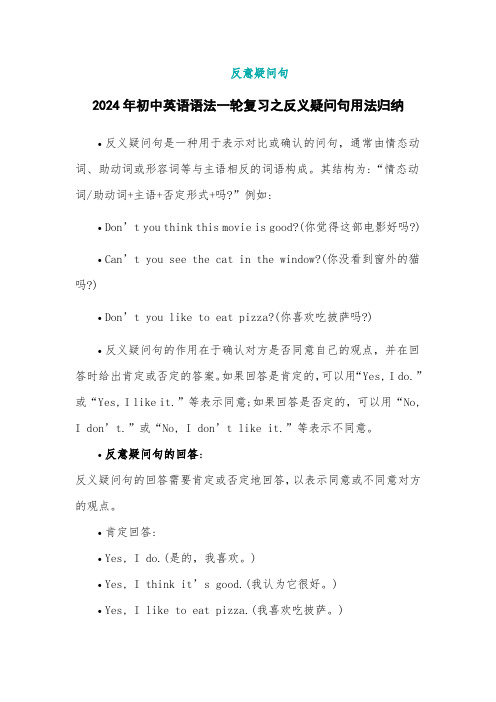
反意疑问句2024年初中英语语法一轮复习之反义疑问句用法归纳•反义疑问句是一种用于表示对比或确认的问句,通常由情态动词、助动词或形容词等与主语相反的词语构成。
其结构为:“情态动词/助动词+主语+否定形式+吗?”例如:•Don’t you think this movie is good?(你觉得这部电影好吗?) •Can’t you see the cat in the window?(你没看到窗外的猫吗?)•Don’t you like to eat pizza?(你喜欢吃披萨吗?)•反义疑问句的作用在于确认对方是否同意自己的观点,并在回答时给出肯定或否定的答案。
如果回答是肯定的,可以用“Yes, I do.”或“Yes, I like it.”等表示同意;如果回答是否定的,可以用“No, I don’t.”或“No, I don’t like it.”等表示不同意。
•反意疑问句的回答:反义疑问句的回答需要肯定或否定地回答,以表示同意或不同意对方的观点。
•肯定回答:•Yes, I do.(是的,我喜欢。
)•Yes, I think it’s good.(我认为它很好。
)•Yes, I like to eat pizza.(我喜欢吃披萨。
)•否定回答:•No, I don’t.(不,我不喜欢。
)•No, I don’t think it’s good.(不,我觉得它不好。
)•No, I don’t like to eat pizza.(不,我不喜欢吃披萨。
) •需要注意的是,在回答反义疑问句时,应该使用正确的语法和标点符号,以确保回答的准确性和清晰度。
回答反义疑问句的原则回答反义疑问句的原则是:肯定回答用“Yes, I do.”或“Yes, I think it’s good.”等表示同意;否定回答用“No, I don’t.”或“No, I don’t think it’s good.”等表示不同意。
英语语法 反意疑问句归纳

英语语法:反意疑问句归纳反意疑问句1. 当前面陈述部分的主语是“this, that”时,反意疑问句的主语用it 代替;当前面陈述部分的主语是“these, those”时,反意疑问句的主语用they 代替;当前面陈述部分是感叹句时,反意疑问句的主语应根据感叹句强调的情况选用it 、they 、he 、she 等。
例如:This is a modern hotel built last year, isn’t it ?Those are the apples bought by your classmates, aren’t they ? What lovely flowers, aren’t they ?How stupid a waitress (she is), isn’t she ?2.当前面陈述部分是“There be …”句型时,反意疑问句仍用there …。
例如:As far as I know, there is a little milk in the fridge, isn’t there ? 对比倒装句中的there:There comes the bus, doesn’t it ? 3.当前面陈述部分是“I am + 表语”时,反意疑问句常用“aren ’t I ”。
例如:I am late, aren’t I ? 对比I’m not late, am I ?4.当不定式、动名词短语及从句等充当前面陈述部分的主语时,反意疑问句中的主语用it 。
例如:Learning how to repair cars takes a long time, doesn’t it ? What we need now is to have a big lunch, isn’t it ?To make a long speech makes no difference to me, doesn’t it ? 5.当前面陈述部分是含有宾语从句的主从复合句,反意疑问句的主语通常与主句的主语一致。
初中英语语法大全之反意疑问句
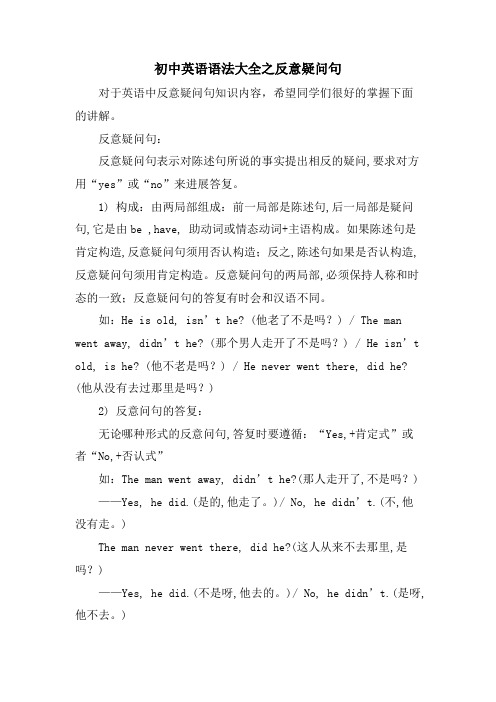
初中英语语法大全之反意疑问句
对于英语中反意疑问句知识内容,希望同学们很好的掌握下面
的讲解。
反意疑问句:
反意疑问句表示对陈述句所说的事实提出相反的疑问,要求对方用“yes”或“no”来进展答复。
1) 构成:由两局部组成:前一局部是陈述句,后一局部是疑问句,它是由be ,have, 助动词或情态动词+主语构成。
如果陈述句是肯定构造,反意疑问句须用否认构造;反之,陈述句如果是否认构造,反意疑问句须用肯定构造。
反意疑问句的两局部,必须保持人称和时态的一致;反意疑问句的答复有时会和汉语不同。
如:He is old, isn’t he? (他老了不是吗?) / The man went away, didn’t he? (那个男人走开了不是吗?) / He isn’t old, is he? (他不老是吗?) / He never went there, did he? (他从没有去过那里是吗?)
2) 反意问句的答复:
无论哪种形式的反意问句,答复时要遵循:“Yes,+肯定式”或
者“No,+否认式”
如:The man went away, didn’t he?(那人走开了,不是吗?) ——Yes, he did.(是的,他走了。
)/ No, he didn’t.(不,他
没有走。
)
The man never went there, did he?(这人从来不去那里,是吗?)
——Yes, he did.(不是呀,他去的。
)/ No, he didn’t.(是呀,他不去。
)
相信上面对英语语法反意疑问句知识的讲解学习,同学们已经能很好的掌握了吧,希望同学们会学习的很好。
完整版)反义疑问句归纳整理
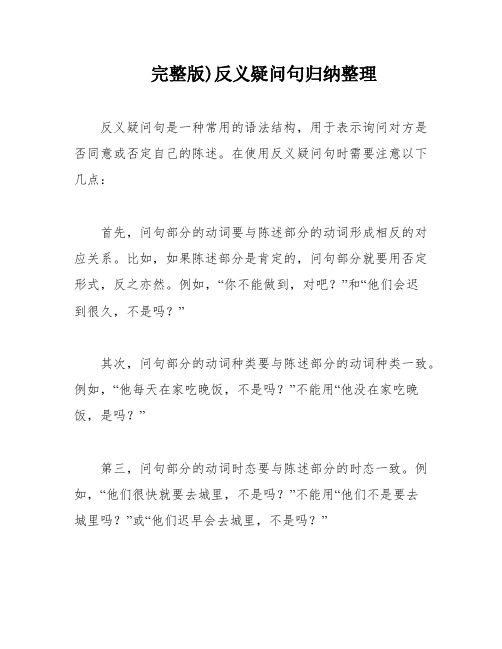
完整版)反义疑问句归纳整理反义疑问句是一种常用的语法结构,用于表示询问对方是否同意或否定自己的陈述。
在使用反义疑问句时需要注意以下几点:首先,问句部分的动词要与陈述部分的动词形成相反的对应关系。
比如,如果陈述部分是肯定的,问句部分就要用否定形式,反之亦然。
例如,“你不能做到,对吧?”和“他们会迟到很久,不是吗?”其次,问句部分的动词种类要与陈述部分的动词种类一致。
例如,“他每天在家吃晚饭,不是吗?”不能用“他没在家吃晚饭,是吗?”第三,问句部分的动词时态要与陈述部分的时态一致。
例如,“他们很快就要去城里,不是吗?”不能用“他们不是要去城里吗?”或“他们迟早会去城里,不是吗?”第四,如果陈述部分含有否定前缀,问句部分要用肯定形式。
例如,“你父亲不开心,是吧?”不能用“他开心吧?”第五,如果陈述部分含有否定意义的词语,问句部分要用肯定式。
例如,“她从不说谎,是吗?”不能用“她不说谎吧?”最后,如果陈述部分是“I am…”,问句部分通常用“aren’t I?”表示。
例如,“我是一个很诚实的人,不是吗?”②I don't have anything to say。
do I?七、当陈述部分为I(We)认为(think)、相信(believe)、假设(suppose)、考虑(consider)+that从句时,问句部分的动词和主语应与that从句内的动词和主语保持一致。
例如:①他已经尽力了,对吧?我认为他已经尽力了,对吧?②我们认为英语很有用,不是吗?(不用don’t we?)八、当陈述部分为I(We)不认为(don't think)、不相信(don't believe)、不假设(don't suppose)、不考虑(don't consider)+that从句时,从句为否定意义,问句部分的动词和主语仍应与that从句保持一致,但使用肯定式。
例如:①我不认为你能做到,对吧?(不用do I?)②我们不相信这个消息是真的,不是吗?(不用do we?)九、当陈述部分为非第一人称主语+ think(believe。
中英语语法反意疑问句归纳总结
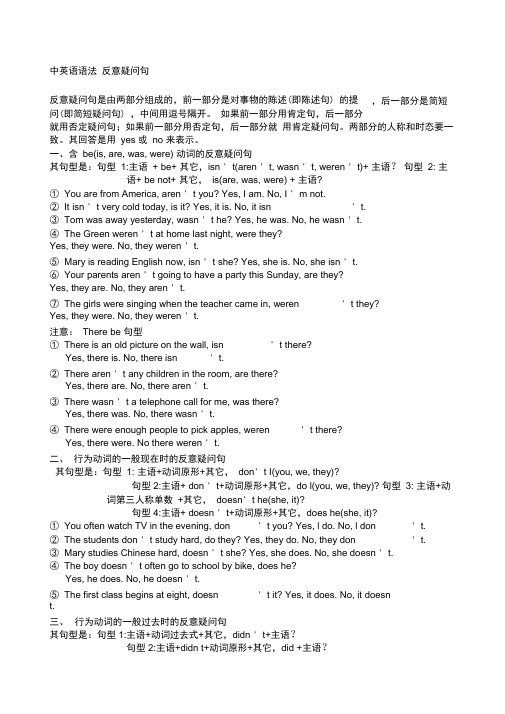
中英语语法反意疑问句反意疑问句是由两部分组成的,前一部分是对事物的陈述(即陈述句) 的提,后一部分是简短问(即简短疑问句) ,中间用逗号隔开。
如果前一部分用肯定句,后一部分就用否定疑问句;如果前一部分用否定句,后一部分就用肯定疑问句。
两部分的人称和时态要一致。
其回答是用yes 或no 来表示。
一、含be(is, are, was, were) 动词的反意疑问句其句型是:句型1:主语+ be+ 其它,isn ' t(aren ' t, wasn ' t, weren ' t)+ 主语?句型2: 主语+ be not+ 其它,is(are, was, were) + 主语?①You are from America, aren ' t you? Yes, I am. No, I ' m not.②It isn ' t very cold today, is it? Yes, it is. No, it isn ' t.③Tom was away yesterday, wasn ' t he? Yes, he was. No, he wasn ' t.④The Green weren ' t at home last night, were they?Yes, they were. No, they weren ' t.⑤Mary is reading English now, isn ' t she? Yes, she is. No, she isn ' t.⑥Your parents aren ' t going to have a party this Sunday, are they?Yes, they are. No, they aren ' t.⑦The girls were singing when the teacher came in, weren ' t they?Yes, they were. No, they weren ' t.注意:There be 句型①There is an old picture on the wall, isn ' t there?Yes, there is. No, there isn ' t.②There aren ' t any children in the room, are there?Yes, there are. No, there aren ' t.③There wasn ' t a telephone call for me, was there?Yes, there was. No, there wasn ' t.④There were enough people to pick apples, weren ' t there?Yes, there were. No there weren ' t.二、行为动词的一般现在时的反意疑问句其句型是:句型1: 主语+动词原形+其它,don' t I(you, we, they)?句型2:主语+ don ' t+动词原形+其它,do l(you, we, they)? 句型3: 主语+动词第三人称单数+其它,doesn' t he(she, it)?句型4:主语+ doesn ' t+动词原形+其它,does he(she, it)?①You often watch TV in the evening, don ' t you? Yes, l do. No, l don ' t.②The students don ' t study hard, do they? Yes, they do. No, they don ' t.③Mary studies Chinese hard, doesn ' t she? Yes, she does. No, she doesn ' t.④The boy doesn ' t often go to school by bike, does he?Yes, he does. No, he doesn ' t.⑤The first class begins at eight, doesn ' t it? Yes, it does. No, it doesnt.三、行为动词的一般过去时的反意疑问句其句型是:句型1:主语+动词过去式+其它,didn ' t+主语?句型2:主语+didn t+动词原形+其它,did +主语?①You watched TV last night, didn 't you? Yes, l did. No, l didn 't.②Jim ' s parents didn 't go to Hong Kong last month, did they?Yes, they did. No, they didn 't.③The rain stopped, didn ' t it? Yes, it did. No, it didn ' t.④Mr. Clarke didn ' t buy a car, didn 't he? Yes, he did. No, he didn 't.四、一般将来时的反意疑问句其句型是:句型1:主语+will+动词原形+其它,won' t+主语?句型2: 主语+ won't + 动词原形+其它,will + 主语?①The boys will play games, won ' t they? Yes, they will. No, they won ' t.②It won ' t stop raining, will it? Yes, it will. No, it won ' t.③Mr. Smith will visit our school next week, won ' t he? Yes, he will. No, hewon' t.注意:There be 句型的一般将来时①There will be a basketball match tomorrow, won ' t there?Yes, there will. No, there won ' t.②There won ' t be too much pollution in the future, will there?Yes, there will. No, there won ' t.五、现在完成时的反意疑问句其句型是:句型1:主语+have+动词过去分词+其它,haven' t+主语?句型2: 主语+ haven' t + 动词过去分词+其它,have +主语? 句型3:主语+has+动词过去分词+其它,hasn' t+主语?句型4: 主语+ hasn' t + 动词过去分词+其它,has +主语?①You have been to Shanghai before, haven ' t you? Yes I have. No, I haven ' t.②You haven ' t been to Shanghai before, have you? Yes I have. No, I haven ' t.③Jack has done his homework, hasn ' t he? Yes, he has. No, he hasn ' t.④Jack hasn ' t done his homework, has he? Yes, he has. No, he hasn ' t.六、现在完成进行时的反意疑问句其句型是:句型1:主语+have been+动词现在分词+其它,haven' t+主语?句型2: 主语+ haven' t been + 动词现在分词+其它,have +主语? 句型3:主语+has been +动词现在分词+其它,hasn' t+主语?句型4: 主语+ hasn' t been + 动词现在分词+其它,has +主语?①You have been skating for five hours, haven ' t you? Yes, I have. No, I havent.②You haven ' t been skating for five hours, have you? Yes, I have. No, I havent.③Bob has been collecting kites since 1999, hasn' t he? Yes, he has. No, he hasn t.④Bob hasn' t been collecting kites since 1999, has he? Yes, he has. No, he hasn t.七、含有情态动词的反意疑问句其句型是:句型1: 主语+情态动词+动词原形+其它,情态动词否定形式+主语? 句型2: 主语+情态动词否定形式+动词原形+其它,情态动词+主语?①You can speak French, can ' t you? Yes, I can. No, I can ' t.②They can ' t understand me, can they? Yes, they can. No, they can ' t.③Ann could swim whenshe was six, couldn ' t she? Yes, she could. No, she couldn t.④The students must study hard, mustn ' t they? Yes, they must. No, they neednt.注意:You must go home now, needn 't you? Yes, I must. No, I needn 't.★ 值得注意的是有时英语的谓语动词并不用否定式(即没加上not ),而是用上了“ never, little, few, hardly, nothing, nobody ”等词,这时该陈述句也属于否定句,因此,反意疑问句的后半部分应用肯定疑问式。
2023年中考英语语法复习反义疑问句

she ?/ hasn’t she?
2.do 助动词(用的 多)
2.have “生病,吃 she had a cold,didn’t she ? 根据实义动词选 喝玩乐,实义动 Tom has a bath,doesn’t he? 择对应的助动词
词”以及have to
英语专项:反义疑问句
have的用法
9. ---You have been to Shanghai before, haven’t you? ---Yes I have. /No, I haven’t.
10. —You haven’t been to the West Lake, have you?
—__A___. But I will go there with my parents this summer vacation.
7. ---The boys will play games, won’t they? ---Yes, they will. /No, they won’t.
8. ---It won’t stop raining, will
it?
---Yes, it will. /No, it won’t.
英语专项:反义疑问句
14.Be quick, will you ?
15.Don’t be late again, will you ?
16.Do it at once, will you
?
17.Let me have a try, will you ?
18.Let us leave now, will you
?
英语专项:反义疑问句
3.陈述句的主语是指示代词this/that, 疑问部分的主语用it;主语是these/ This is an English car, isn’t it? those,疑问部分用they
- 1、下载文档前请自行甄别文档内容的完整性,平台不提供额外的编辑、内容补充、找答案等附加服务。
- 2、"仅部分预览"的文档,不可在线预览部分如存在完整性等问题,可反馈申请退款(可完整预览的文档不适用该条件!)。
- 3、如文档侵犯您的权益,请联系客服反馈,我们会尽快为您处理(人工客服工作时间:9:00-18:30)。
中英语语法反意疑问句反意疑问句是由两部分组成的,前一部分是对事物的陈述(即陈述句),后一部分是简短的提问(即简短疑问句),中间用逗号隔开。
如果前一部分用肯定句,后一部分就用否定疑问句;如果前一部分用否定句,后一部分就用肯定疑问句。
两部分的人称和时态要一致。
其回答是用yes或no来表示。
一、含be(is, are, was, were)动词的反意疑问句其句型是:句型1:主语+ be+其它,isn’t(aren’t, wasn’t, weren’t)+ 主语?句型2:主语+ be not+其它,is(are, was, were) + 主语?① You are from America, aren’t you? Yes, I am. No, I’m not.② It isn’t very cold today, is it? Yes, it is. No, it isn’t.③ Tom was away yesterday, wasn’t he? Yes, he was. No, he wasn’t.④ The Green weren’t at home last night, were they? Yes, they were. No, they weren’t.⑤ Mary is reading English now, isn’t she? Yes, she is. No, she isn’t.⑥ Your parents aren’t going to have a party this Sunday, are they?Yes, they are. No, they aren’t.⑦ The girls were singing when the teacher came in, weren’t they?Yes, they were. No, they weren’t.注意:There be句型① There is an old picture on the wall, isn’t there?Yes, there is. No, there isn’t.② There aren’t any children in the room, are there?Yes, there are. No, there aren’t.③ There wasn’t a telephone call for me, was there?Yes, there was. No, there wasn’t.④ There were enough people to pick apples, weren’t there?Yes, there were. No there weren’t.二、行为动词的一般现在时的反意疑问句其句型是:句型1: 主语+动词原形+其它,don’t I(you, we, they)?句型2: 主语+ don’t+动词原形+其它,do I(you, we, they)?句型3: 主语+动词第三人称单数+其它,doesn’t he(she, it)?句型4: 主语+ doesn’t+动词原形+其它,does he(she, it)?① You often watch TV in the evening, don’t you? Yes, I do. No, I don’t.② The students don’t study hard, do they? Yes, they do. No, they don’t.③ Mary studies Chinese hard, doesn’t she? Yes, she does. No, she doesn’t.④ The boy doesn’t often go to school by bike, does he?Yes, he does. No, he doesn’t.⑤ The first class begins at eight, doesn’t it? Yes, it does. No, it doesn’t.三、行为动词的一般过去时的反意疑问句其句型是:句型1: 主语+动词过去式+其它,didn’t+主语?句型2: 主语+didn’t+动词原形+其它,did +主语?① You watched TV last night, didn’t you? Yes, I did. No, I didn’t.② Jim’s parents didn’t go to Hong Kong last month, did they?Yes, they did. No, they didn’t.③ The rain stopped, didn’t it? Yes, it did. No, it didn’t.④ Mr. Clarke didn’t buy a car, didn’t he? Yes, he did. No, he didn’t.四、一般将来时的反意疑问句其句型是:句型1: 主语+will+动词原形+其它,won’t+主语?句型2: 主语+ won’t +动词原形+其它,will +主语?① The boys will play games, won’t they? Yes, they will. No, they won’t.② It won’t stop raining, will it? Yes, it will. No, it won’t.③ Mr. Smith will visit our school next week, won’t he? Yes, he will. No, he won’t.注意:There be句型的一般将来时① There will be a basketball match tomorrow, won’t there?Yes, there will. No, there won’t.② There won’t be too much pollution in the future, will there?Yes, there will. No, there won’t.五、现在完成时的反意疑问句其句型是:句型1: 主语+have+动词过去分词+其它,haven’t+主语?句型2: 主语+ haven’t +动词过去分词+其它,have +主语?句型3: 主语+has+动词过去分词+其它,hasn’t+主语?句型4: 主语+ hasn’t +动词过去分词+其它,has +主语?① You have been to Shanghai before, haven’t you? Yes I have. No, I haven’t.② You haven’t been to Shanghai before, have you? Yes I have. No, I haven’t.③ Jack has done his homework, hasn’t he? Yes, he has. No, he hasn’t.④ Jack hasn’t done his homework, has he? Yes, he has. No, he hasn’t.六、现在完成进行时的反意疑问句其句型是:句型1: 主语+have been+动词现在分词+其它,haven’t+主语?句型2: 主语+ haven’t been +动词现在分词+其它,have +主语?句型3: 主语+has been +动词现在分词+其它,hasn’t+主语?句型4: 主语+ hasn’t been +动词现在分词+其它,has +主语?① You have been skating for five hours, haven’t you? Yes, I have. No, I haven’t.② You haven’t been skating for five hours, have you? Yes, I have. No, I haven’t.③ Bob has been collecting kites since 1999, hasn’t he? Yes, he has. No, he hasn’t.④ Bob hasn’t been collecting kites since 1999, has he? Yes, he has. No, he hasn’t.七、含有情态动词的反意疑问句其句型是:句型1: 主语+情态动词+动词原形+其它,情态动词否定形式+主语?句型2: 主语+情态动词否定形式+动词原形+其它,情态动词+主语?① You can speak French, can’t you? Yes, I can. No, I can’t.② They can’t understand me, can they? Yes, they can. No, they can’t.③ Ann could swim when she was six, couldn’t she? Yes, she could. No, she couldn’t.④ The students must study hard, mustn’t they? Yes, they must. No, they needn’t.注意:You must go home now, needn’t you? Yes, I must. No, I needn’t.★值得注意的是有时英语的谓语动词并不用否定式(即没加上not),而是用上了“never, little, few, hardly, nothing, nobody”等词,这时该陈述句也属于否定句,因此,反意疑问句的后半部分应用肯定疑问式。
① You have never been to Beijing, have you? Yes, I have. No, I haven’t.② Mr. Fat has few friends here, does he? Yes, he does. No, he doesn’t.③ There is little milk in the bottle, is there? Yes, there is. No, there isn’t.④ He could do nothing, could he? Yes, he could. No, he couldn’t.八、祈使句用于反意疑问句中这种类型较特殊,前一部分是祈使句,后一部分是肯定疑问形式。
